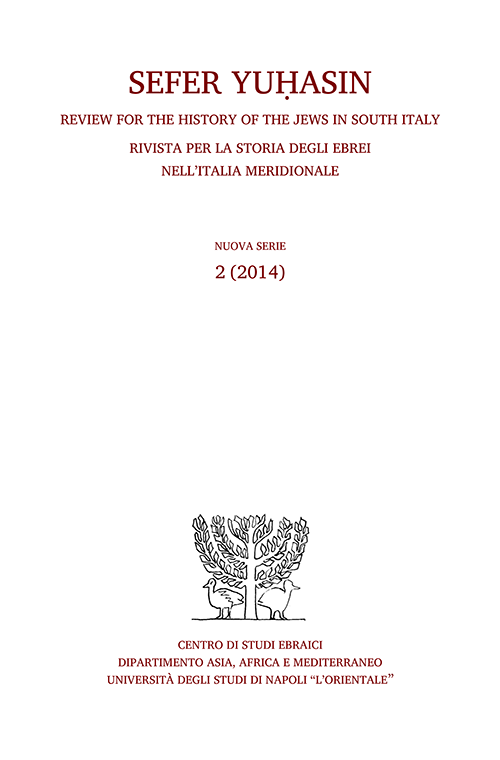Gli ebrei in costa d’Amalfi al tempo di Ferdinando I d’Aragona: il caso di Maiori
DOI:
https://doi.org/10.6092/2281-6062/5573Abstract
The Jews on the Coast of Amalfi in the Days of Ferdinand I of Aragon: The Case of Maiori
In May of 1494 the coastal village of Maiori in the Duchy of Amalfi was struck by a huge number of death cases, that brought on the suspension of customs’ activities and tohe postponement of one of the most important fairs of the Middle Ages in Southern Italy: the Salerno fair. A few months later the Jews Moyse de Gannectao and Gabriele de Salomone left Maiori to continue their activity as money-lenders in some safer place in the Kingdom of Naples. Discussing known and less known documents, the paper shows how the case of Maiori can be regarded as a microcosm which allows one to discover the importance of the presence of Jewish lenders in the Kingdom, and moreover to comprehend the social, economic and political conditions at the court of Ferdinand I of Aragon at the end of the 15th century. The article presents also two interesting documents from the Archivio Capitolare in the church Collegiata di Santa Maria a Mare of Maiori; the first one reports a royal order for the requisition of the registers of all loans and of all the pawns left as collateral to the Jewish bankers and lenders of the Duchy of Amalfi; the second document identifies the exact place where the Jewish community of Maiori used to meet: a room in the front part of the church of Madonna della Libera, still in the heart of the town.
Downloads
Downloads
Published
How to Cite
Issue
Section
License
Gli autori che pubblicano su questa rivista accettano le seguenti condizioni:
- Gli autori mantengono i diritti sulla loro opera e cedono alla rivista il diritto di prima pubblicazione dell'opera, contemporaneamente licenziata sotto una Licenza Creative Commons - Attribuzione che permette ad altri di condividere l'opera indicando la paternità intellettuale e la prima pubblicazione su questa rivista.
- Gli autori possono aderire ad altri accordi di licenza non esclusiva per la distribuzione della versione dell'opera pubblicata (es. depositarla in un archivio istituzionale o pubblicarla in una monografia), a patto di indicare che la prima pubblicazione è avvenuta su questa rivista.
- Gli autori possono diffondere la loro opera online (es. in repository istituzionali o nel loro sito web) prima e durante il processo di submission, poiché può portare a scambi produttivi e aumentare le citazioni dell'opera pubblicata (Vedi The Effect of Open Access).


